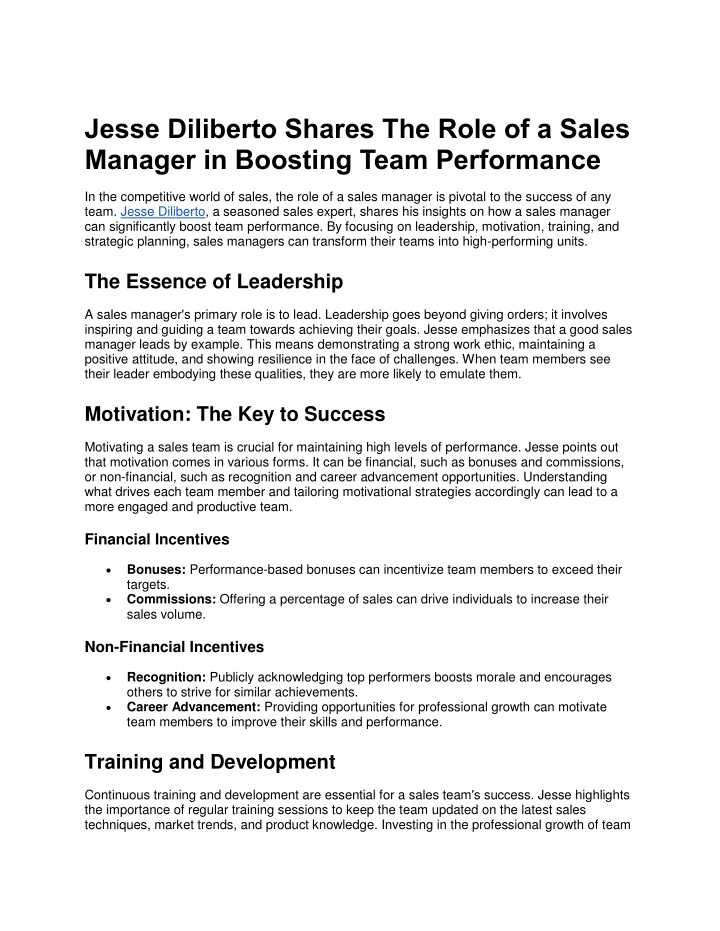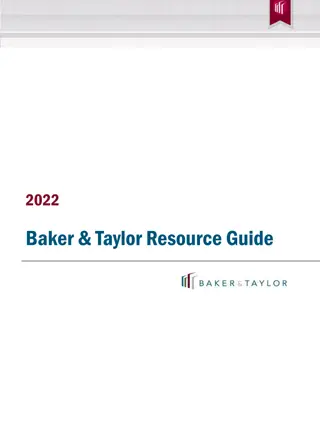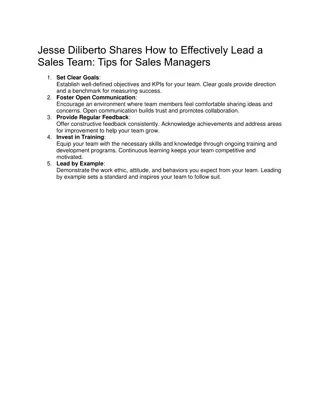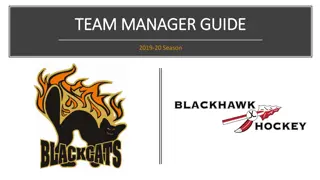
Jesse Diliberto Shares The Role of a Sales Manager in Boosting Team Performance
In the competitive world of sales, the role of a sales manager is pivotal to the success of any team. Jesse Diliberto, a seasoned sales expert, shares his insights on how a sales manager can significantly boost team performance. By focusing on leader
Download Presentation

Please find below an Image/Link to download the presentation.
The content on the website is provided AS IS for your information and personal use only. It may not be sold, licensed, or shared on other websites without obtaining consent from the author. If you encounter any issues during the download, it is possible that the publisher has removed the file from their server.
You are allowed to download the files provided on this website for personal or commercial use, subject to the condition that they are used lawfully. All files are the property of their respective owners.
The content on the website is provided AS IS for your information and personal use only. It may not be sold, licensed, or shared on other websites without obtaining consent from the author.
E N D
Presentation Transcript
Jesse Diliberto Shares The Role of a Sales Manager in Boosting Team Performance In the competitive world of sales, the role of a sales manager is pivotal to the success of any team. Jesse Diliberto, a seasoned sales expert, shares his insights on how a sales manager can significantly boost team performance. By focusing on leadership, motivation, training, and strategic planning, sales managers can transform their teams into high-performing units. The Essence of Leadership A sales manager's primary role is to lead. Leadership goes beyond giving orders; it involves inspiring and guiding a team towards achieving their goals. Jesse emphasizes that a good sales manager leads by example. This means demonstrating a strong work ethic, maintaining a positive attitude, and showing resilience in the face of challenges. When team members see their leader embodying these qualities, they are more likely to emulate them. Motivation: The Key to Success Motivating a sales team is crucial for maintaining high levels of performance. Jesse points out that motivation comes in various forms. It can be financial, such as bonuses and commissions, or non-financial, such as recognition and career advancement opportunities. Understanding what drives each team member and tailoring motivational strategies accordingly can lead to a more engaged and productive team. Financial Incentives Bonuses: Performance-based bonuses can incentivize team members to exceed their targets. Commissions: Offering a percentage of sales can drive individuals to increase their sales volume. Non-Financial Incentives Recognition: Publicly acknowledging top performers boosts morale and encourages others to strive for similar achievements. Career Advancement: Providing opportunities for professional growth can motivate team members to improve their skills and performance. Training and Development Continuous training and development are essential for a sales team's success. Jesse highlights the importance of regular training sessions to keep the team updated on the latest sales techniques, market trends, and product knowledge. Investing in the professional growth of team
members not only enhances their skills but also shows that the company values their development. Key Areas of Training Sales Techniques: Regular workshops on advanced sales tactics can help team members refine their approach. Market Trends: Keeping the team informed about industry trends enables them to better understand customer needs and preferences. Product Knowledge: Comprehensive knowledge of the products or services being sold is crucial for convincing potential customers. Strategic Planning and Goal Setting A clear strategy and well-defined goals are the backbone of any successful sales team. Jesse stresses the importance of setting realistic and achievable targets. By involving the team in the goal-setting process, managers can ensure that everyone is aligned with the company's objectives and committed to achieving them. Steps in Strategic Planning 1. Assessment: Evaluate the current performance and identify areas for improvement. 2. Goal Setting: Define clear, measurable, and time-bound goals. 3. Action Plan: Develop a detailed plan outlining the steps needed to achieve the goals. 4. Monitoring: Regularly review progress and make necessary adjustments to stay on track. Building a Positive Team Culture A positive team culture is essential for maintaining high morale and productivity. Jesse believes that fostering a collaborative and supportive environment can lead to better performance. Encouraging open communication, celebrating successes, and addressing conflicts promptly are key elements in building a strong team culture. Elements of a Positive Team Culture Open Communication: Encouraging team members to share ideas and feedback fosters a sense of belonging and mutual respect. Celebrating Success: Recognizing and celebrating achievements boosts morale and motivates the team to continue performing well. Conflict Resolution: Addressing conflicts promptly and fairly ensures a harmonious working environment. Conclusion The role of a sales manager in boosting team performance cannot be overstated. Through effective leadership, motivation, training, strategic planning, and fostering a positive team
culture, sales managers can transform their teams into high-performing units. Jesse Diliberto's insights provide a valuable roadmap for sales managers looking to elevate their team's performance and achieve outstanding results. By implementing these strategies, sales managers can not only enhance the productivity of their teams but also contribute significantly to the overall success of their organizations.






















